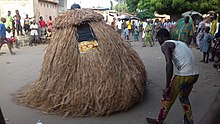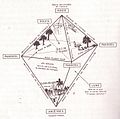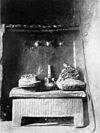Portal:Traditional African religions
Introduction The beliefs and practices of African people are highly diverse, including various ethnic religions. Generally, these traditions are oral rather than scriptural and are passed down from one generation to another through folk tales, songs, and festivals, and include beliefs in spirits and higher and lower gods, sometimes including a supreme being, as well as the veneration of the dead, and use of magic and traditional African medicine. Most religions can be described as animistic with various polytheistic and pantheistic aspects. The role of humanity is generally seen as one of harmonizing nature with the supernatural. In the past, African religion used to be referred to as 'traditional' but this is no longer appropriate. 'Traditional' was used to distinguish Africa religion from Abrahamic religion which came to the continent as a result of proselytism. Colonialism supported the false view that Africa had no religion. (Full article...) Selected article
The Serer creation myth is the traditional creation myth of the Serer people of Senegal, the Gambia and Mauritania. Many Serers who adhere to the tenets of the Serer religion believe these narratives to be sacred. Some aspects of Serer religious and Ndut traditions are included in the narratives contained herein but are not limited to them. The Serer people have many gods, goddesses and Pangool but one supreme deity and creator called Roog (or Koox in the Cangin languages). Serer creation myth developed from Serer oral traditions, Serer religion, legends, cosmogonies. The specifics of the myth are also found in two main Serer sources: A nax and A leep. The former is a short narrative for a short myth or proverbial expression, whilst the later is for a more developed myth. Broadly, they are equivalent to verbs and logos respectively, especially when communicating fundamental religious education such as the supreme being and the creation of the Universe. In addition to being fixed-Serer sources, they set the structure of the myth. The creation myth of the Serer people is intricately linked to the first trees created on Planet Earth by Roog. Earth's formation began with a swamp. The Earth was not formed until long after the creation of the first three worlds: the waters of the underworld; the air which included the higher world (i.e. the sun, the moon and the stars) and earth. Roog is the creator and fashioner of the Universe and everything in it. The creation is based on a mythical cosmic egg and the principles of chaos. Selected imagesFestivalsThere are several religious festivals found in the various Traditional African religions. Some of these are listed below next to their corresponding religion :
Selected biography
Akhenaten (/ˌækəˈnɑːtən/; also spelled Echnaton, and Khuenaten; meaning "Effective for Aten"), known before the fifth year of his reign as Amenhotep IV), was an ancient Egyptian pharaoh of the 18th Dynasty who ruled for 17 years and died perhaps in 1336 BC or 1334 BC. He is noted for abandoning traditional Egyptian polytheism and introducing worship centered on the Aten, which is sometimes described as monolatristic, henotheistic, or even quasi-monotheistic. An early inscription likens the Aten to the sun as compared to stars, and later official language avoids calling the Aten a god, giving the solar deity a status above mere gods.
Akhenaten tried to shift his culture from Egypt's traditional religion, but the shifts were not widely accepted. After his death, his monuments were dismantled and hidden, his statues were destroyed, and his name excluded from the king lists. Traditional religious practice was gradually restored, and when some dozen years later rulers without clear rights of succession from the 18th Dynasty founded a new dynasty, they discredited Akhenaten and his immediate successors, referring to Akhenaten himself as "the enemy" or "that criminal" in archival records. Selected quote
Source: "The Oxford Handbook of Global Religions", (Editor: Department of Global and International Studies University of California Mark Juergensmeyer Professor of Sociology and Director, Santa Barbara), p. 537, Oxford University Press, USA (2006), ISBN 9780199727612 [1]
Did you know
Related portalsTopicsFor more Traditional African religion topics, see Category:Traditional African religions.
CategoriesWikiProjectsThings you can doAssociated WikimediaThe following Wikimedia Foundation sister projects provide more on this subject:
Discover Wikipedia using portals |








































